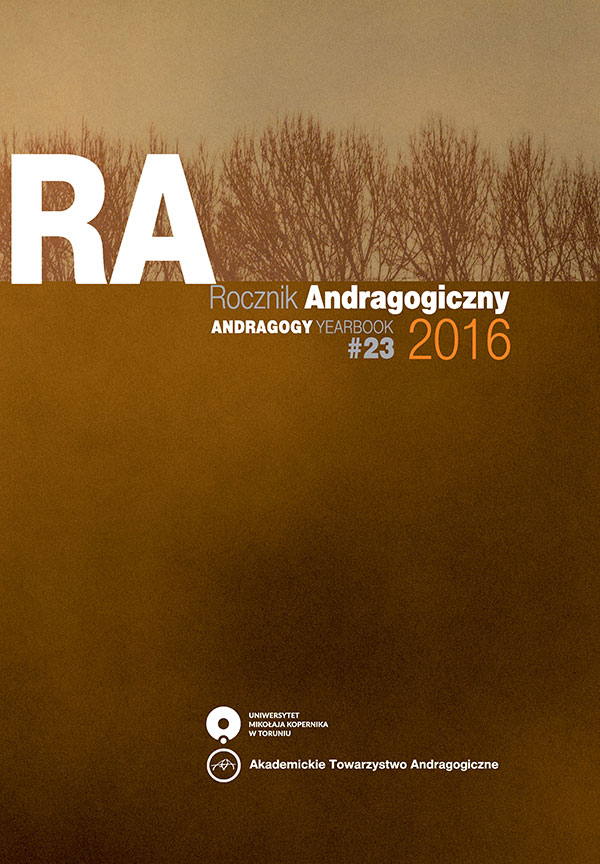Phenomenography as a research method and its cognitive consequences in the light of one research project on adult learning experiences. Researcher’s reflection
DOI:
https://doi.org/10.12775/RA.2016.014Keywords
phenomenography, adult learning, educational experiencesAbstract
The main aim of this article is to reconstruct the basic features of phenomenography as the methodological approach and method of gathering data in educational research. Referring to publications of Ferec Marton, the main creator of this method, the author tries to name basic issues important for researchers who want to undertake phenomenography in their projects. What is more she unveils her experiences connected with her own research on adult learning conducted in the phenomenography perspective. In her opinion, there are very important cognitive consequences of applying this method in projects which create its potential at the same time. The first one is that phenomenography does not divide the world of our experiences into black and white; it feeds the shadows and allows to define the world through the prism of different colours of one phenomenon. The second feature is showing that the distinction of experiences is rooted in the world of culture in which we exist. The third is that thanks to this method a researcher does not only reconstruct social practices but they can show that a society needs these practices and cannot even imagine that their everyday life could be changed.References
Brookfield S. D. (2005), The power of critical theory for adult learning and teaching, New York.
Dahglern L. O., Abrandt-Dahlgren M,. Hult H., Hard af Segerstad H., Szkudlarek T., Gajda M., Jurgiel A., Kopciewicz L., Marzec J., Męczkowska A., Mendel M. (2005), Conceptions of learning among teachers and students in higher education: a swedish-polish comparative study, [w:] T. Maliszewski, W. J. Wójtowicz, J. Żerko (red.), Anthology of social and behavioural sciences, Linköping.
Eklund-Myrskong G. (1998), Students’ conceptions of learning in different educational contexts, „Higher Education”, nr 35.
Fox D. (1983), Personal theories of teaching, „Studies in Higher Education”, vol. 8, nr 2.
Franke A., Dahlgren L. O. (1996), Conceptions of mentoring: an empirical study of conceptions of mentoring during the school- based teacher education, „Teaching and Teacher Education”, vol. 12, nr 6.
Hasselegren B., Beach D. (1997), Phenomenografhy: A good-for nothing brother of phenomenology?, „Higher Education Research and Development” 1997, vol. 16, nr 2.
Jurgiel – Aleksander A. (2014), The mechanism of creating educational experience as the indicator of educational competence in the narrations of adult students. An excerpt from case study, “Edukacja Dorosłych”, nr 1.
Jurgiel A. (2008), Doświadczanie dorosłości w byciu studentem. Fragment badania fenomenograficznego, „Dyskursy Młodych Andargogów”, nr 9.
Jurgiel A. (2011), Walka o zmianę statusu a (nie)moc kształcenia w świetle analizy doświadczeń edukacyjnych kobiet. Studium biograficzne, „Rocznik Andragogiczny”.
Jurgiel- Aleksander A. (2013), Doświadczenie edukacyjne w perspektywie andragogicznej. Studium biograficzno-fenomenograficzne, Gdańsk.
Jurgiel-Aleksander A. (2015), Jaka edukacja i dla kogo? Biografie edukacyjne dorosłych i ich społeczny wymiar, „Rocznik Andragogiczny”.
Marton F. (1986), Phenomenography: A Research Approach to Investigating Different Understandings of Reality, „Journal of Thought” 1986, vol. 21, nr 3.
Marton F., Booth S. (1997), Learning and awarness, Mahwah, N. J.: Erlbaum Associates.
Męczkowska A. (2002), Od świadomości nauczyciela do konstrukcji świata społecznego. Nauczycielskie koncepcje wymagań dydaktycznych a problem rekonstrukcyjnej kompetencji ucznia, Kraków.
Nowicka M. (2010), Socjalizacja na lekcjach w klasach początkowych. Praktyki –przestrzenie–konceptualizacje, Toruń.
Richardson J. T. E. (1999), The concepts and methods of phenomenographic research, „Review of Educational Research” 1999, Vol. 69, No 1, p. 53–58.
Szkudlarek T. (1997), Poststrukturalizm a metodologia pedagogiki, „Socjologia Wychowania” t. 13, z. 317.
Downloads
Published
How to Cite
Issue
Section
Stats
Number of views and downloads: 746
Number of citations: 0



